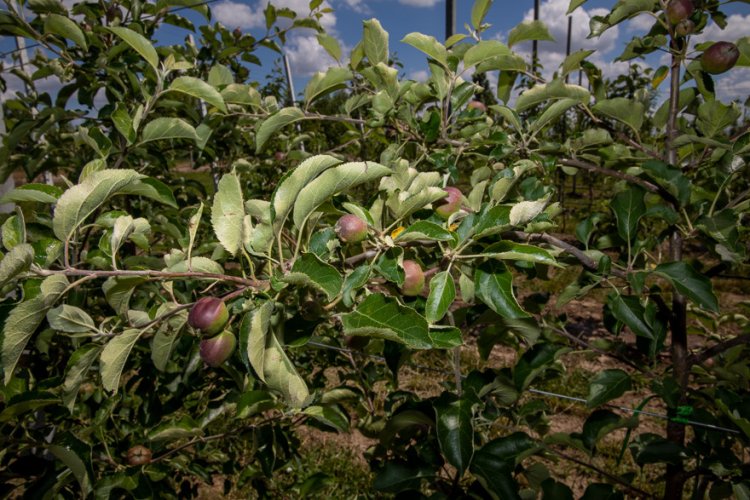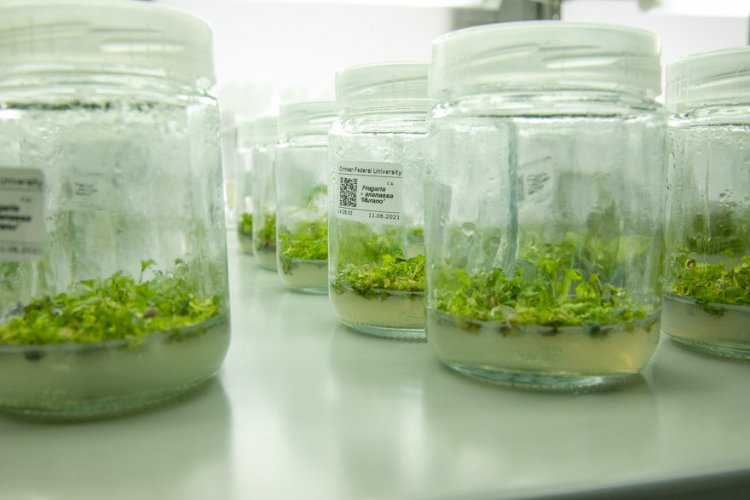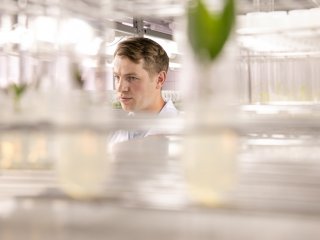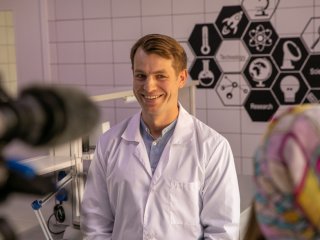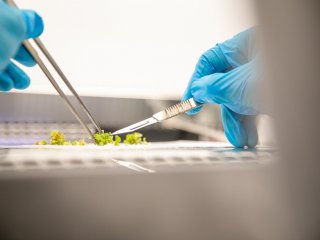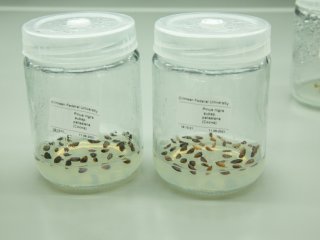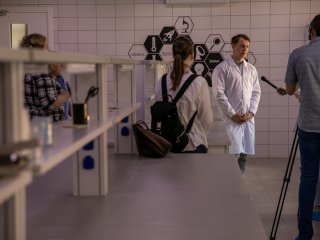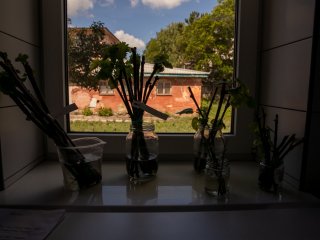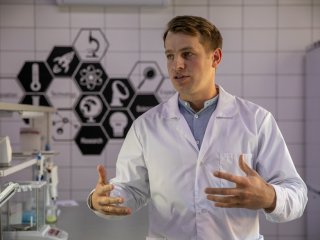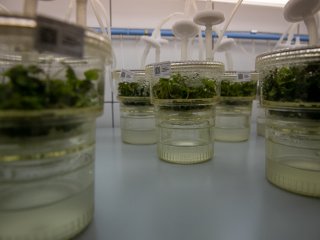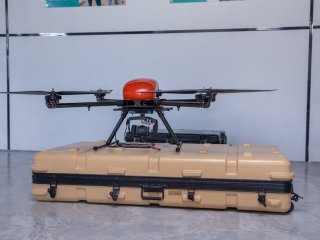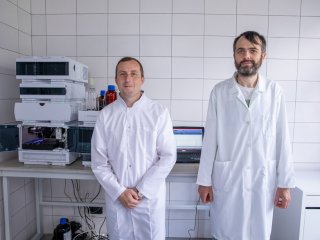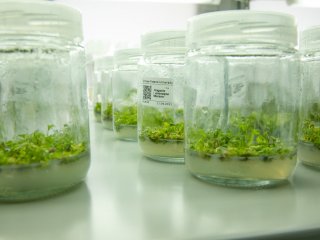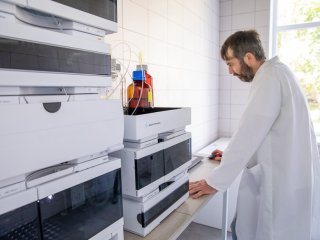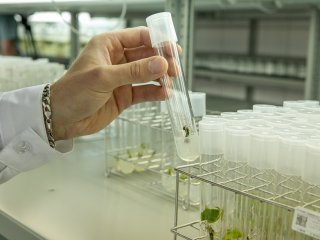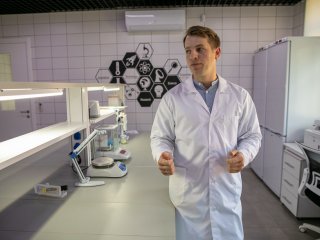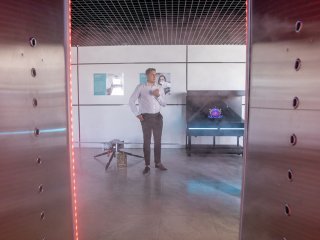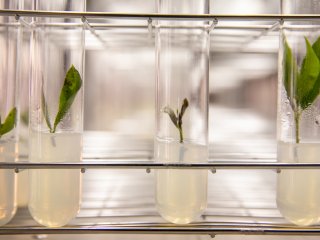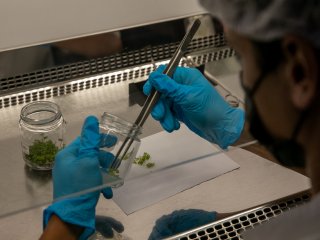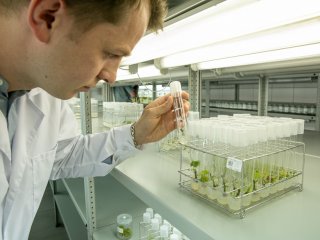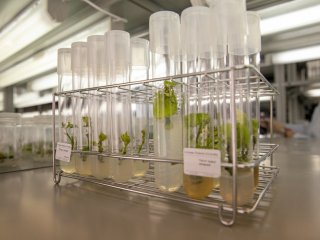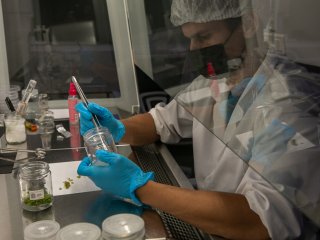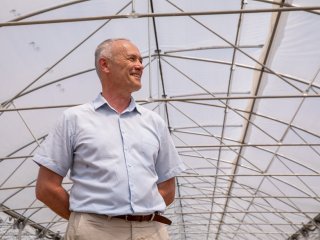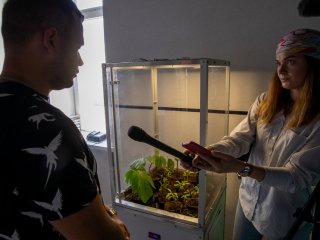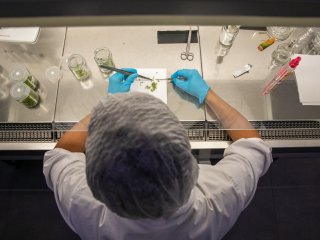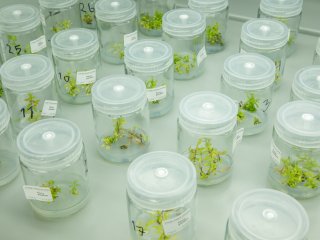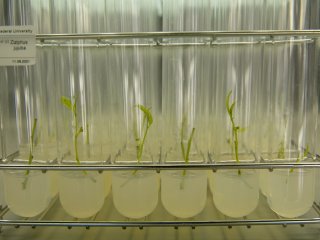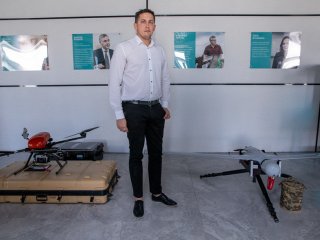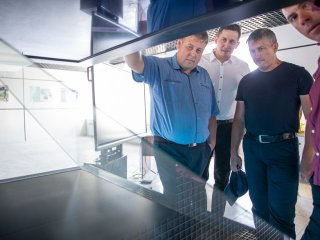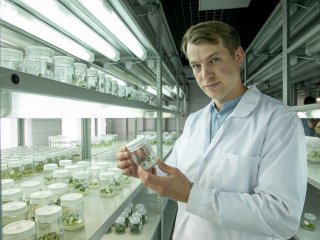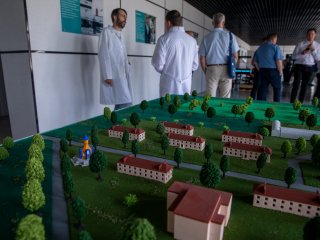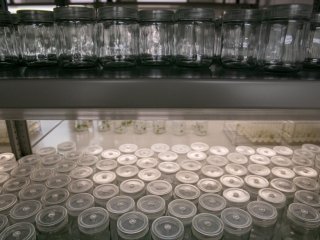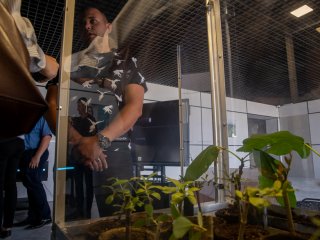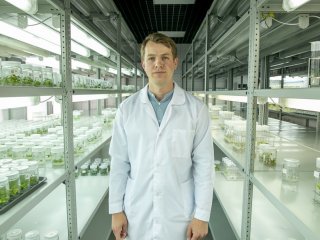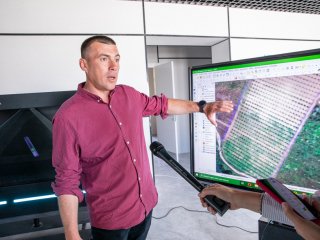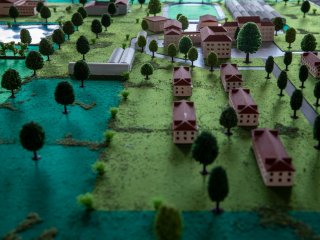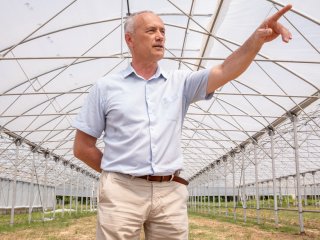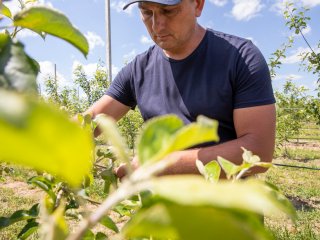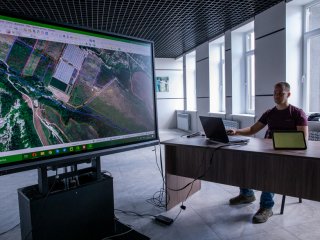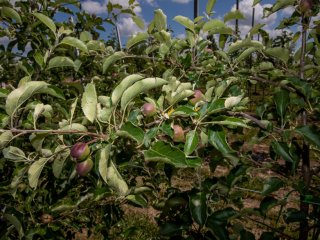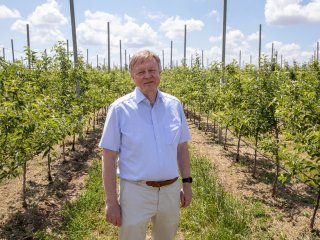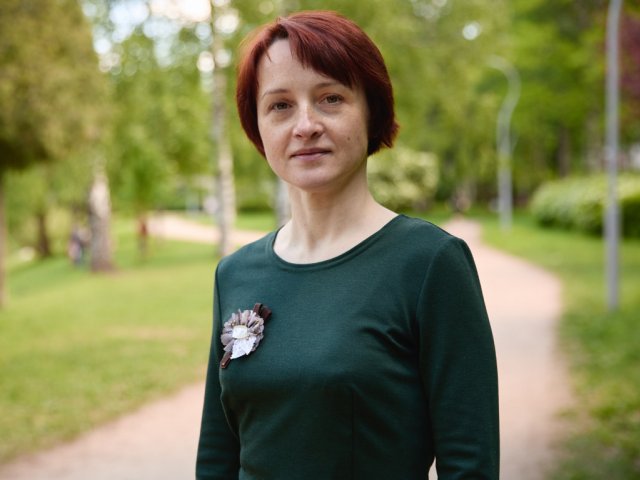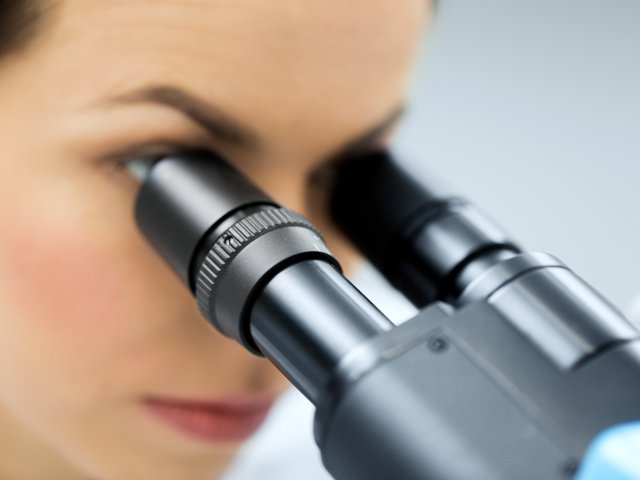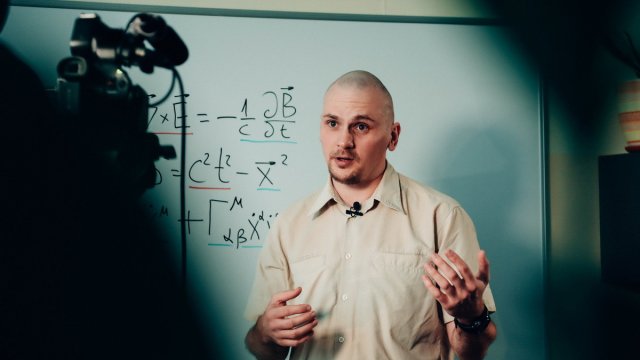On June 13, during the course of the press tour to the Republic of Crimea organized in Year of Science and Technology, the Scientific Russia portal visited the Agropolis agricultural innovations valley of the Crimean Federal University in the village of Malenkoye, Simferopol District, where the university is working on a number of projects in agri- and biotechnology. Agropolis is engaged in basic, exploration and applied research, aiming to form and preserve in living form gene collections of various fruit crops, add new, valuable varieties, forms and hybrids to the collections, and develop and improve methods for studying plants and rapid assessment of selection material.
Lavr Andreevich Kryukov, Head of the Laboratory of Microclonal Propagation of Plants of the Vernadsky Crimean Federal University, spoke of the laboratory activities and demonstrated experimental material subjected to diagnostics. “The main goal of the laboratory is semi-industrial production of virus-free planting stock. Our function is to build a chain for production of original source material that is in demand with commercial companies, and produce it in industrial and semi-industrial batches. The laboratory is producing up to 3 million plant units,” Mr. Kryukov said.
Comments from Lavr Andreevich Kryukov, Head of the Laboratory of Microclonal Propagation of Plants of Vernadsky Crimean Federal University
The most popular fruit crops in the Crimean Peninsula are wild strawberry, grapes, and blackberry. These specimens are used to test the plants for pathogens using the cryotherapy technique (liquid nitrogen treatment). “We want the material as clean as possible. We are cooperating with chemists directly for them to create selective phenol adsorbents,” head of the laboratory added.
At the Chromatographical Laboratory, Dmitry Dmitrievich Yermolin, Head of the Wine-Making Subdepartment of the Agrotechnical Academy of the Vernadsky
Crimean Federal University, demonstrated how the special device designed to detect bio-active substances in Crimean plant material works. “Our preliminary research revealed that the Crimean raw material contains more steroid components than similar fruit crops that grow in regions of Russia. This opens vast prospects for cultivation of plants and production of bio-active supplements,” Dmitry Yermolin said.
Comments from Dmitry Dmitrievich Yermolin, Head of the Wine-Making Subdepartment of the Agrotechnology Academy of Vernadsky
Mikhail Mikhailovich Krainyuk, senior professor at the Geodesy and Geoinformatics Subdepartment at the Agrotechnology Academy of Vernadsky Crimean Federal University, jointly with colleagues from the Cyber Agriculture Center of Vernadsky Crimean Federal University, demonstrated the latest Russian-made high-resolution unmanned aerial vehicle used to assess fertility of low-access areas based on bird’s view footage. “Infrared specter allows us to calculate NDVI – Normalized Difference Vegetation Index, which will show agricultural specialists the state of plant health and areas in need of intervention,” Mikhail Krainyuk said. “Spatial resolution allows seeing elements of plants’ morphometric structure rather than just plants. And this offers broad possibilities for processing the images and for agronomists’ work,” Viktor Smirnov, leading research officer of the Cyber Agriculture Center of Vernadsky Crimean Federal University, added.
Comments from Mikhail Krainyuk, senior professor at the Geodesy and Geoinformatics Subdepartment at the Agrotechnology Academy of Vernadsky Crimean Federal University, and Viktor Smirnov, leading research officer of the Cyber Agriculture Center of Vernadsky Crimean Federal University
In the hothouse, Aleksey Alekseevich Zavaly, Head of the General Technical Disciplines Subdepartment at the Agrotechnology Academy of Vernadsky Crimean Federal University, spoke of the development of a thermal control system, climate systems, and automation of soil, seed and plant processing. “The main area for automated soil, seed and plant processing is physical processing methods. They lower chemical pressure on the soil significantly, make produce safer and improve the background climate of the entire environment,” Mr. Zavaly said.
Comments from Aleksey Alekseevich Zavaly, Head of the General Technical Disciplines Subdepartment at the Agrotechnology Academy of Vernadsky Crimean Federal University
Aleksandr Vitalievich Demchuk, Deputy Director of the Agro-Industrial College of Vernadsky Crimean Federal University, explained garden irrigation by drip watering. “This type of watering saves moisture and delivers water to the tree routes directly. We use meadow formation as well – we sow grass in the row spacing, mow it from time to time, preventing weeds growing,” Aleksandr Demchuk pointed out.
Comments from Aleksandr Vitalievich Demchuk, Deputy Director of the Agro-Industrial College of Vernadsky Crimean Federal University
According to Anatoly Vladimirovich Kubyshkin, Vice Rector for Scientific Work at Vernadsky Crimean Federal University, the innovations valley will enable pro-active introduction of modern Russian technologies to develop agroindustrial crops. “Our innovation platform includes all cycles of agricultural production of plants. The main thing is that science is the central component of it all. This means introduction of the world's most advanced technologies and development of our own technologies with crops grown in Crimea,” Anatoly Kubyshkin, Vice Rector for Scientific Work of Vernadsky Crimean Federal University, said.
Comment from Anatoly Vladimirovich Kubyshkin, Vice Rector for Scientific Work at Vernadsky Crimean Federal University
This material was prepared with the support from the Ministry of Science and Higher Education and the Russian Academy of Sciences.
